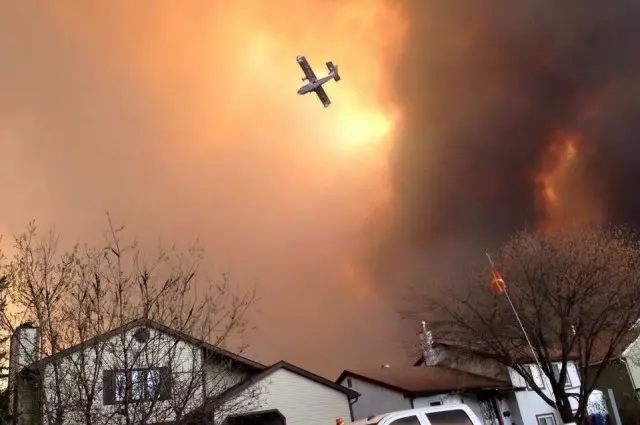The spread of the huge wildfire in western Canada that has forced a massive evacuation in the oil sands town of Fort McMurray in northern Alberta province appeared to be slowing down on Sunday, partly thanks to favorable weather.
Meanwhile, some of the local residents who had been forced to flee north from Fort McMurray moved back through the town to head south to the major cities of Alberta.
Fort McMurray was still too dangerous to enter. Police continued to escort vehicles through the town as needed. The evacuees had been camped outside in nearby towns, including some 25,000 people in the oil sands work camps in the north.
Some of the evacuees going back through Fort McMurray told Xinhua on the phone that it was heart-breaking to see their hometown burned town.
Marissa Hees, a resident of Fort McMurray, said she and her husband, two dogs, a cat and seven kittens left the town several days as the blaze ripped through it. Going back through the town, it felt like going through a war-torn place still blanked with many smokes, she said.
The country's biggest wildfire, which broke out about a week ago, continued to spread east across the unpopulated forests, but appeared to be growing "much more slowly" than predicted after burning more than 1,610 square km, said Alberta Premier Rachel Notley.
Officials said on Sunday that crews will begin examining the damage from blaze and check on the infrastructure like natural gas lines and the power grid. However, they said there is no timeline for the evacuees to be allowed back into their homes, and firefighting is still the top priority.
Amy Goodwin, another resident, said she was lucky to be able to take what was necessary and leave the town when the fire came several days ago with horrifying black smokes and flying pine needles.
Joshua Slye, an oil industry worker, said he saw fires engulfing the neighborhoods and the trees when fleeing the town several days ago.
Officials have expressed some optimism that they are beginning to get on top of the wildfire, as cooler weather and light rain stopped the blaze from growing as much as feared and the winds took the flames away from Fort McMurray.
Meteorological services also predicted a chance of a small amount of snow Tuesday or Wednesday because of an approaching cold air mass.
"This is great firefighting weather, we can really get in here and get a handle on this fire, and really get a death grip on it," Alberta fire official Chad Morrison said in a news briefing.
Nevertheless, the wildfire outside of Fort McMurray could take quite some time to douse as fire control officials said it is not uncommon for a fire of this size to burn for months.
Altogether 43 fires are burning across Alberta's forests, seven of them still out of control, including the wildfire dubbed as the "beast."
More than 500 firefighters, alongside 15 helicopters and 14 air tankers, are battling the blazes. Over the past seven days, the wildfire has destroyed more than 1,600 homes and buildings and forced 88,000 people to flee from their homes.
While its threat to the neighboring province of Saskatchewan is not imminent, the biggest concern is the smoke, according to fire control officials.
Both Suncor and Syncrude, the two Canadian oil companies with oil sands work sites in north of Fort McMurray, have evacuated their facilities as a precautionary measure.
No one has been killed in the wildfire so far and the evacuation has been carried out in an orderly manner. However, Notley said she regretted the deaths of two people who were killed as their vehicle struck a truck while fleeing the blaze.
Canadian Prime Minister Justin Trudeau has said the federal government would match all individual donations made to the Canadian Red Cross.
"Canadians are with you, our thoughts are with you, our prayers are with you. As prime minister, I want you to know that our government and all Canadians will stand by you and support you now and when it is time to rebuild," he said in a message to residents of Fort McMurray. Enditem
 简体中文
简体中文

